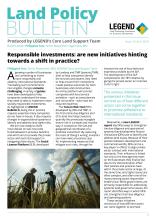/ library resources
Showing items 1 through 9 of 30.ABSTRACTED FROM INTRODUCTION:
At the beginning of this textbook, the authors would like to make two suggestions about how to approach the study of property law.
This guide aims to help communities develop “interest-based” negotiation skills and understand how to use a range of tools to deal with the power imbalance between them and those trying to take their housing, land and resources.
This bulletin distils lessons from a sugarcane cooperative in Malawi and a forestry investment scheme in Sierra Leone, drawing on the five pillars of inclusive business as identified in the 2018 LEGEND state of the debate report.
From forced eviction to loss of livelihood, social status, savings and even life, land corruption in Africa has serious and far-reaching consequences. Such corruption comes in many forms, and it must be understood – along with the factors that enable it – before it can be tackled.
This bulletin highlights initiatives to support socially responsible investment.
In Nigeria, the recurring impoverishment and other negative socioeconomic impacts endured by landholders affected by expropriation are well-documented and call into question the Land Use Act’s (LUA) effectiveness in protecting local land rights.
This paper examines whether national expropriation and land laws in 30 countries across Asia and Africa put Indigenous Peoples and local communities at risk of expropriation without compensation.
The training manual provides a complete course for journalists – covering all aspects of researching, constructing, and presenting a land corruption story – which can be downloaded (for free) and used by trainers with or without prior experience of investigating land issues.
Paginação
Land Library Search
Through our robust search engine, you can search for any item of the over 73,000 highly curated resources in the Land Library.
If you would like to find an overview of what is possible, feel free to peruse the Search Guide.







